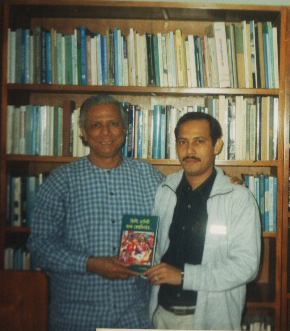Should there be a business, which is beneficial for the society as a whole, but not necessarily a cash-thriving exercise for an individual or a corporation! Or is it possible to run a business entity that does not earn currencies, but fetches socio-economic development for a concerned group of people!
Meet Professor Muhammad Yunus, a soft spoken Bangladeshi economist turned revolutionary banker to the poor turned a prime mover of social engineering. The one and only Nobel laureate of the poverty-stricken country, Prof Yunus pioneered the practice of official micro-lending and later established ‘Grameen Bank of Bangladesh’ in 1983. The seventy-year crossed innovative professor also shared 2006 Nobel Peace Prize with the banking institution, headquartered in Dhaka.
But, the self-sown and grown enmity of Bangladesh Prime Minister Sheikh Hasina resulted in the ousting of Prof Yunus from the prestigious financial establishment in 2011. Many believe that the daughter of Bangabandhu Sheikh Mujibur Rahman became jealous when Prof Yunus received the Nobel, as Ms Hasina herself was expecting the coveted award for her successful role as a peace maker in the violence-hit south Bangladesh in her previous stint as the Prime Minister.
Though Prof Yunus was ousted as the managing director of Grameen Bank arguing that he was over-aged, the creator of micro-finance banking remains the policy maker of many Grameen sister concerns devoting to various initiatives like drinking water, yogurt for malnourished children, cell phones, solar power for rural homes etc. Moreover, his spirit was not diminished with the attitude of the Bangladesh authorities and he continues working for his mission to make the world poverty-free.
The futuristic social scientist is now preaching for a different kind of economic enterprise that emphasizes social development and not profit for investors. Prof Yunus terms it ‘social business’, which is a form of business looking to solve social problems. His book ‘Building Social Business’, a copy of which was presented to this writer by Prof Yunus himself during a recent Dhaka visit, describes everything about the new kind of capitalism that serves humanity’s most pressing needs.
The book narrates that social business is a new category of cause-driven business. Here the investors or owners can gradually recoup the money invested, but cannot take any dividend (profit) beyond that point. The purpose of the investment is purely to achieve one or more social objectives through the operation of the company, and no personal gain is desired by the investors. The company definitely covers all costs and at the same time it achieves the social objectives like healthcare for the poor, housing for the needy, financial services for the down trodden, nutrition for malnourished children, safe drinking water, renewable energy for all and so on.
The man, who has shown the way towards dignified life for millions of poor Bangladeshi women through micro-finance, argues that the present concept of entrepreneurship is one-dimensional – intending only to maximize profits. By defining ‘entrepreneur’ in a broader way, one can change the character of capitalism radically and solve many of the unresolved social and economic problems within the scope of a free market. He, at the same time, pointed out, if profit and greed are the sole driving forces in modern society, then why should we have churches, mosques, temples, schools, art museums, public parks or community healthcare centres and why would there be any charities, foundations or non-profit organizations?
Prof Yunus argues that there is still a keen desire among many to lend a hand through good works, for addressing the problems of poverty and other social problems. Charity itself is rooted in the basic human concern for other humans. These days, concern is usually expressed in the shape of non-profits and NGOs which may take various names and forms. Then there are aid organisations sponsored by richer governments, he elaborates.
Though Prof Yunus believes that charity may be essential in some cases when people have to depend on it, because it is seemingly impossible for them to support themselves, otherwise, he has some reservation on charity and typical corporate social responsibility initiatives. Arguing that there is nothing wrong with donations, charity and traditional CSR, but Prof Yunus points out that these have a one-time effect only.
The society or the poor would have to wait to get the same benefit until the donors do the same again, which completely depends on their intention to do so. However, if people get everything free because donations pour in from the international community, we would not be building the economy in under-developed countries. Moreover, life cannot go on in charity mode all the time, asserts Prof Yunus.
Explaining a prediction of a future world, Prof Yunus pointed out that there may be two ways to go about it. One would be to invite the best scientific, technical and economic analysts in the world to make their most accurate twenty-year projections. Another would be to ask the world’s most brilliant science-fiction writers to imagine the world of 2030.
“If you ask me who has the best chance of coming closer to the reality of 2030, without pausing for a second, I would say that the science-fiction writers would be far closer than the expert analysts. The reason is very simple. Experts are trained to make forecasts on the basis of the past and the present, but events in the real world are driven by the dreams of people,” said Prof Yunus.
He also added, “Do our dreams sound impossible? If they do, that means they are likely to come true if we believe in them and work for them… If you are willing to share these dreams with me – and to join the people around the world who are already beginning to transform their dreams into reality through social business, let’s undertake this exciting journey together.”






